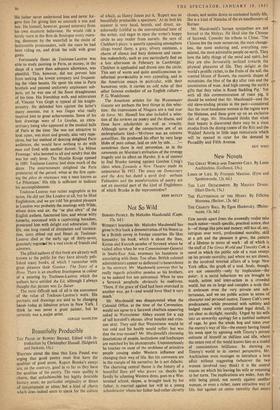Beautifully Producible
WRITTEN about the time that Ezra Pound was urging that good poetry must first have the qualities of good prose, Rupert Brooke's essays are, on the contrary. good in so far as they have the qualities of his poetry. The main quality is charm, that unfashionable but highly desirable literary asset; no particular originality or thrust of temperament or ideas; but a kind of charm which does indeed seem to speak for the culture
of which, as Henry James put it, 'Rupert was so beautifully producible a specimen.' At its best his manner is very local, boyish, and direct, un- ashamedly faithful to the conversational tone of the writer, and eager to open the writer's happy circle to any reader from outside. He says of Chekhov's plays: 'a queerly appealing atmosphere clings round them: a grey, silvery mistiness, a charm of silence and hazy distances and cause- less melancholy, such as you particularly find on a late afternoon in February in Cambridge.' Chekhov is applauded and drawn into the circle. This sort of warm and quite unselfconscious in- tellectual provinciality is very appealing, and in the American essays in particular, with their humorous style, it carries an odd echo of that other famous embodier of an English culture— P. G. Wodehouse.
The American articles for the Westminster Gazette are perhaps the best things in this selec- tion: the impressions of Niagara are a real tour de force. Mr. Hassan has also included a selec- tion of the reviews on poetry and the drama, and these have scholarship as well as vivacity. Although some of the comparisons are of an undergraduate kind—'Marlowe was an extreme pointilliste. He produced his effect by very large blobs of pure colour, laid on side by side. . .
sometimes there is real perception, as in the comments on Marston's stylisation of the revenge tragedy and its effect on Hamlet. It is of interest to find Brooke turning against Gordon Craig's ideas when Towards a New Theatre made its appearance in 1913 The essay on Democracy and the Arts has dated a eogd deal perhaps Fabianism and the popularisation of poetry are not an essential part of the kind of Englishness of which Brooke is the representative?
JOHN BAYLEY


































 Previous page
Previous page